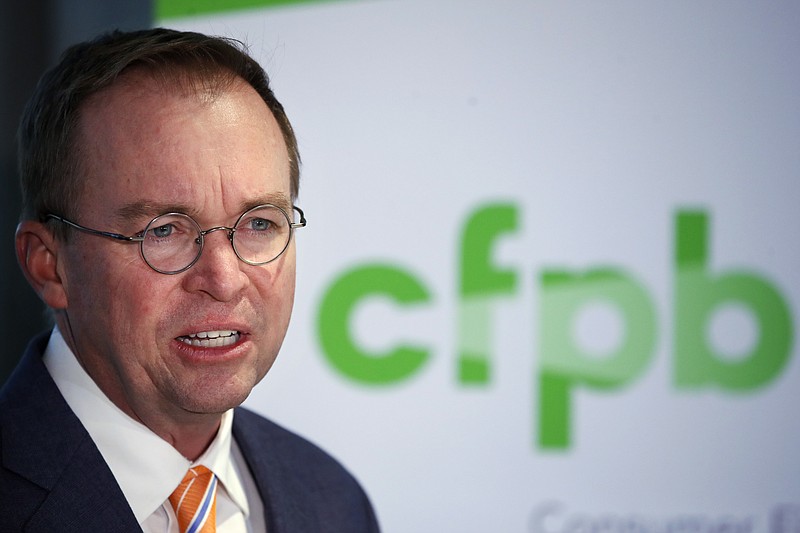The Trump-appointed acting director of the Consumer Financial Protection Bureau said Wednesday that he is launching a review of all the federal consumer watchdog agency's policies and priorities.
It's the second major step taken this week by Mick Mulvaney, who took over as acting director in late November, to reshape the bureau. On Tuesday, the bureau announced a review of its recently enacted rules for payday lending.
The review is the clearest sign yet that the future direction and role of the CFPB, which has existed for less than a decade, will be dramatically different than it was under the Obama administration.
In a statement Wednesday, Mulvaney said he is publishing formal requests for information for all "enforcement, supervision, rulemaking, market monitoring, and education activities" of the bureau, effectively the entire bureau's operations. Requests for information are a beginning step by federal agencies such as the CFPB to make changes to any rules they may have already put into place.
"In this New Year, and under new leadership, it is natural for the bureau to critically examine its policies and practices to ensure they align with the bureau's statutory mandate," Mulvaney said.
The CFPB was created in the aftermath of the housing market bubble, 2008 financial crisis and the subsequent Great Recession. It was the brainchild of Elizabeth Warren, who at the time was a Harvard University law professor, and now is a U.S. senator from Massachusetts. It was designed as a consumer-centric federal regulator with a mandate to go after banks, credit card companies, debt collectors and other financial companies for bad behavior.
Under its first permanent director, Richard Cordray, the CFPB exercised its mandate aggressively, putting into place new regulations impacting huge swaths of the banking industry from mortgages to prepaid debit cards.
Cordray and the CFPB got high praise from Democrats, the Obama White House and consumer advocacy groups, but at the same time made enemies with Republicans in Congress, who would call the CFPB a rogue agency. One of those Congressional Republicans was Mulvaney, who as a Republican representative from South Carolina, once called the CFPB a "sick joke" of an agency.
What rules Mulvaney wants to review, tweak, or repeal is unknown. His announcement Wednesday was broad, aimed at the entire operations of the bureau.
In a two paragraph statement Tuesday, the CFPB announced it "intends to engage in a rulemaking process so that the Bureau may reconsider the Payday Rule" for payday, vehicle tile and other high-cost installment loans.
Although most provisions of the Payday Rule do not go into effect until August 2019, the CFPB wants its staff to review the pending changes and could potentially scrap or alter the rules that limit who qualifies for payday loans and could reduce the number of such loans in half.
Jabo Covert, vice president of government relations for the Cleveland, Tenn.,-based payday lender Check Into Cash, welcomed the CFPB review of the pending payday lending rules, although he said Check Into Cash and others in the industry are still having to prepare for the change in rules next year.
"We are certainly supportive of this move, but exactly what it means and how it changes the timeline and rules we don't know yet," he said.
Dennis Shaul, CEO of the the payday lenders trade group Community Financial Services Association of America (CFSA), called the pending payday lending rule "a tremendous blow to the more than 1 million Americans who spoke out against it during last year's comment period.
"Millions of American consumers use small-dollar loans to manage budget shortfalls or unexpected expenses," he said. "The CFPB's misguided rule will only serve to cut off their access to vital credit when they need it the most."
But the payday lending rules adopted by the CFPB last year were praised by Suzanne Martindale, senior attorney for Consumers Union, who said the rule "targets the most abusive short-term lending practices" while "paving the way for more responsible lenders to emerge with safer alternatives."
Warren said it's clear Mulvaney wants to dismantle the CFPB. She said 29 million Americans have recovered $12 billion thanks to the bureau's efforts, and she hopes "every single one of them writes to tell Mulvaney they want an agency that keeps fighting for them."
While the CFPB's director has broad powers on what he or she chooses to enforce or prioritize, it could take years for a Trump-controlled CFPB to undo the regulations put in place under the Obama administration. For example the CFPB started work on the payday lending rules back in 2012.
This would not be the first federal agency that has seen a dramatic change in its direction under the Trump administration. The Environmental Protection Agency, under Scott Pruitt, has reshuffled its priorities away from issues such as climate change. The Federal Communications Commission late last year voted to repeal its net neutrality rules put into place under the Obama administration.
